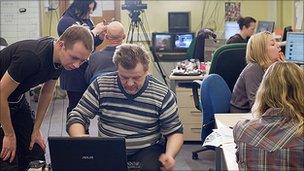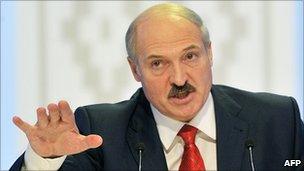Poland leads EU push for change in Belarus
- Published

Belsat TV says some of its journalists have been harassed by Belarus police
Poland is spearheading moves within the European Union to tighten sanctions against Belarusian officials after the authorities' crackdown against the opposition.
The Polish foreign ministry told the BBC that it had unilaterally imposed a travel ban on Belarusian officials entering the country and had proposed extending it to include all EU member states.
"Poland drafted its national register of names of representatives of the Belarusian regime who are included on the travel ban. That register is already operational," foreign ministry spokesman Marcin Bosacki said.
Warsaw is also proposing that Brussels should block EU funds to Minsk, suspend high-level meetings with the Belarusian authorities and pressure them to release pro-democracy activists.
Belarusian police arrested about 700 people in a crackdown on opposition protests on 19 December, following a presidential election which gave a fourth term to Alexander Lukashenko. International observers condemned the ballot as flawed.
Painful memories
"Europe has not seen anything like this in years. The combination of vote-rigging and outright repression makes what [Slobodan] Milosevic tried to do in Serbia in 2000 pale in comparison," Poland's Foreign Minister Radoslaw Sikorski wrote in a joint letter with his German, Swedish and Czech counterparts, shortly after the violence.
"What we have seen brings back memories of the introduction of martial law in Poland in 1981," they added.
Polish mass opposition to Communist rule in the 1980s played a pivotal role in undermining Soviet power in Eastern Europe.
In tandem with its policy to isolate Mr Lukashenko and his circle in Minsk, Poland is now boosting its support for civil society in the ex-Soviet republic.
Poland has waived visa fees for ordinary Belarusian citizens wishing to enter the country. Students expelled for their opposition activities have been offered the chance to continue their education in Polish universities. Warsaw city authorities have also approved a plan to open a Centre for Belarusian Opposition.
The government has pledged to double its 2011 development funds to Belarus to 40m zloty (£8.6m; $13.9m) and Warsaw will host an international donors' conference for Belarus next month.
Voices of dissent
Poland is also continuing its financial support for Belsat TV, a Belarusian satellite TV station based in a busy small office in central Warsaw.

President Lukashenko drew international criticism over his handling of the December election
Belsat TV began broadcasting to Belarus three years ago and, according to its editorial director Alexei Dziekawicki, is now watched by about one million people - about 10% of the population.
Belsat TV's offices in Belarus were raided by police, who seized computers and cameras from some reporters. Three spent up to 15 days in jail. Despite the repression, the station managed to increase its output.
"It's kind of a test. If they are fighting we must fight back," Mr Dziekawicki said. "If we know that people in Belarus need more information we must do this. With the same number of journalists we increased our programming. It's more difficult now, but we are not going to surrender."
Poland's actions are motivated partly by a desire to have a stable democratic neighbour on its eastern border and also because the two countries share deep historical ties. The two countries formed part of the same state in the early modern era and Poles are still the second largest ethnic minority in today's Belarus, after Russians.
EU policy review
Warsaw likes to think of itself as an expert on the EU's eastern neighbours. Mr Sikorski co-devised the EU's Eastern Partnership as a vehicle to encourage Belarus and the EU's other eastern neighbours to modernise and comply with the 27-member bloc's standards.
Warsaw will be promoting its role as an eastern expert when it takes over the EU presidency in the second half of this year.
In 2008 Warsaw took advantage of gestures from Minsk that the regime was prepared to contemplate liberalisation to step up dialogue. This culminated in Mr Sikorski and his German counterpart, Guido Westerwelle, meeting Mr Lukashenko in Minsk in November, to urge him to ensure democratic elections.
Some analysts believe that policy has backfired on Poland.
"The general feeling in the foreign ministry is one of horror and outrage that we have been tricked and we've been made fools of at our own request. Now we're paying the price," Konstanty Gebert, a columnist for the daily Gazeta Wyborcza, told the BBC.
"Our claim to be experts on the East has just received a kick up the backside," he added.
The foreign ministry flatly denied that viewpoint.
"Poland's status as an expert on Belarus within the EU has by no means been compromised by the recent violent events in Belarus. Quite the contrary, Poland is the main initiator for European Union action on Belarus and its voice matters a good deal, both to the EU and the US," Mr Bosacki said.
"Discussion in the EU on how best to deal with the present situation in Belarus is ongoing. There are many countries favouring a most firm response, Poland being one of them," he added.
The EU is due to decide on co-ordinated actions against Belarus at the end of the month. Building a consensus in support of Poland's proposals will be tough. Countries like Italy have already opposed imposing an EU-wide travel ban on Belarusian officials.
"It's a mess and Lukashenko is laughing all the way to the bank," Mr Gebert said.
- Published12 January 2011
- Published11 January 2011
- Published31 December 2010
- Published30 December 2010